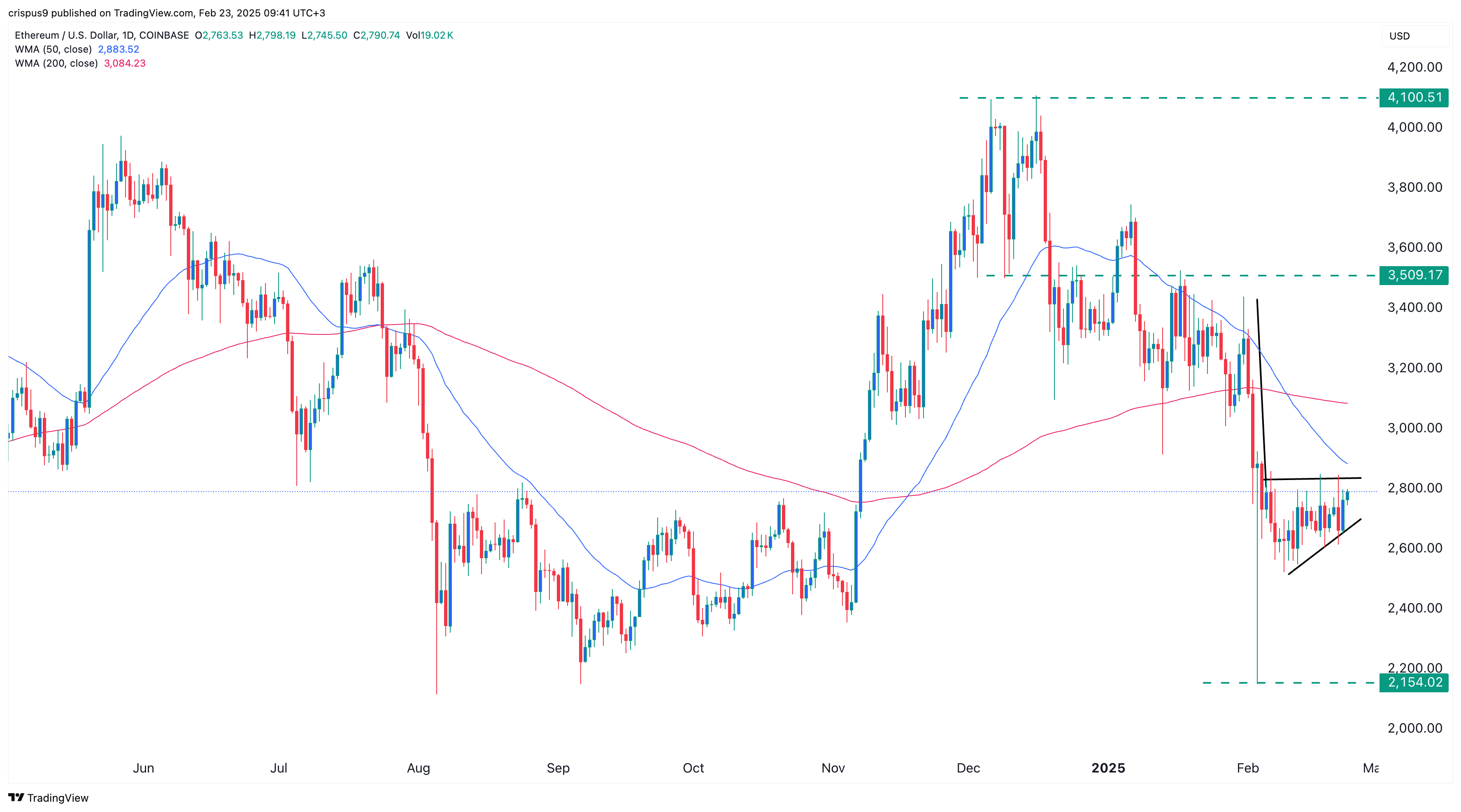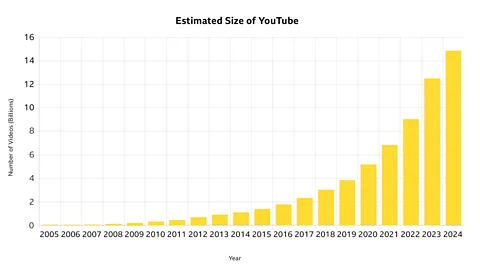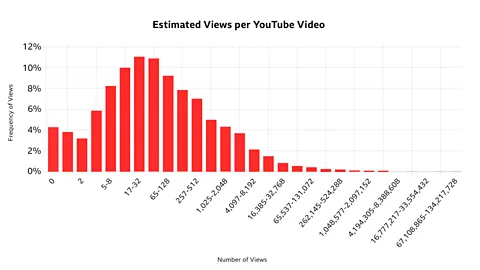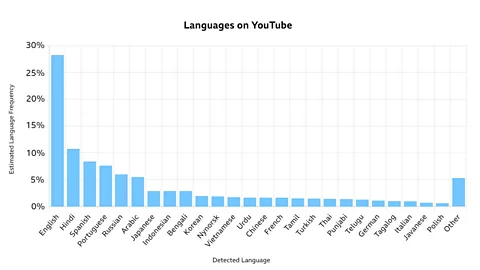Admin
[OPINION] BEYOND THE HEADLINES: Pope Francis Deserves Compassionate Media Coverage - Jude Eze
How a computer that 'drunk dials' videos is exposing YouTube's secrets
YouTube is about to turn 20. An unusual research method is unveiling statistics about the platform that Google would rather keep hidden.
YouTube may not seem secretive. It's public facing. You can watch an endless stream of content from now until your dying breath. There's been a mountain of research about the platform, unpacking everything from the commodified economy that surrounds it to the radicalising effects of its algorithm. But the picture goes blurry when you start asking simple questions. For example: how much YouTube do we all watch?
Google, which owns YouTube, is quiet about that and many other details. In February, the company revealed that people who access YouTube on their TVs collectively watch one billion hours a day, but total numbers for the platform are an enigma. Estimates say YouTube has around 2.5 billion monthly users – almost one in three people on Earth – and the average mobile app user watches something like 29 hours a month. With that, let's try some back-of-the-napkin maths.
If we make a few assumptions, and say that monthly viewing average for app users can be applied across all YouTube users on both the website and television, we can multiply 2.5 billion by 29 hours. This would tell us that humanity consumes something like 8.3 million years of videos on YouTube every month. Over 12 months, that adds up to almost 100 million years, hundreds of times longer than the sum total of human history.
How many YouTube videos are there? What are they about? What languages do YouTubers speak? As of 14 February 2025, the platform's will have been running for 20 years. That is a lot of video. Yet we have no idea just how many there really are. Google knows the answers. It just won't tell you.
Qatar Signs Deal with Scale AI to Use AI to Boost Government Services
Qatar's government has signed a five-year deal with AI data company Scale AI to deploy AI-powered tools and training in a push to improve government services in the Gulf Arab state, a senior Scale AI executive told Reuters on Sunday.
"(This deal) can be a blueprint for other governments around the world, and it allows us to really commit in a way that I think could drive impact even faster," said Trevor Thompson, global head of growth at the San Francisco, California-based company.
The deal will allow Qatar's government to adopt tools such as predictive analytics, automation and advanced data analysis in an effort to streamline operations, said a statement by Qatar's communications and information technology ministry.
Scale AI will develop more than 50 possible uses of artificial intelligence (AI) for Qatar's government over the next five years, the statement added.
[english.aawsat]
Chinese medical devices are in health systems across U.S., and the government and hospitals are worried
- Chinese-made medical devices pose an imminent threat, warn the FDA, CISA and the American Hospital Association.
- The federal government’s cyber watchdog recently discovered a “backdoor” that can easily be exploited on a widely used piece of hospital monitoring equipment.
- Chinese-made medical devices are found in almost every corner of the health-care ecosystem due to relatively low costs, and there are at least thousands of these monitors in hospitals and clinics across the U.S.
A popular medical monitor is the latest device produced in China to receive scrutiny for its potential cyber risks. However, it is not the only health device we should be concerned about. Experts say the proliferation of Chinese health-care devices in the U.S. medical system is a cause for concern across the entire ecosystem.
The Contec CMS8000 is a popular medical monitor that tracks a patient’s vital signs. The device tracks electrocardiograms, heart rate, blood oxygen saturation, non-invasive blood pressure, temperature, and respiration rate. In recent months, the FDA and the Cybersecurity and Infrastructure Security Agency (CISA) both warned about a “backdoor” in the device, an “easy-to-exploit vulnerability that could allow a bad actor to alter its configuration.”
CISA’s research team described “anomalous network traffic” and the backdoor “allowing the device to download and execute unverified remote files” to an IP address not associated with a medical device manufacturer or medical facility but a third-party university — “highly unusual characteristics” that go against generally accepted practices, “especially for medical devices.”
“When the function is executed, files on the device are forcibly overwritten, preventing the end customer—such as a hospital—from maintaining awareness of what software is running on the device,” CISA wrote.
The warnings says such configuration alteration could lead to, for instance, the monitor saying that a patient’s kidneys are malfunctioning or breathing failing, and that could cause medical staff to administer unneeded remedies that could be harmful.
The Contec’s vulnerability doesn’t surprise medical and IT experts who have warned for years that medical device security is too lax.
Hospitals are worried about cyber risks
“This is a huge gap that is about to explode,” said Christopher Kaufman, a business professor at Westcliff University in Irvine, California, who specializes in IT and disruptive technologies, specifically referring to the security gap in many medical devices.
The American Hospital Association, which represents over 5,000 hospitals and clinics in the U.S., agrees. It views the proliferation of Chinese medical devices as a serious threat to the system.
As for the Contec monitors specifically, the AHA says the problem urgently needs to be addressed.
“We have to put this at the top of the list for the potential for patient harm; we have to patch before they hack,” said John Riggi, national advisor for cybersecurity and risk for the American Hospital Association. Riggi also served in FBI counterterrorism roles before joining the AHA.
CISA reports that no software patch is available to help mitigate this risk, but in its advisory said the government is currently working with Contec.
Contec, headquartered in Qinhuangdao, China, did not return a request for comment.
One of the problems is that it is unknown how many monitors there are in the U.S.
“We don’t know because of the sheer volume of equipment in hospitals. We speculate there are, conservatively, thousands of these monitors; this is a very critical vulnerability,” Riggi said, adding that Chinese access to the devices can pose strategic, technical, and supply chain risks.
In the short-term, the FDA advised medical systems and patients to make sure the devices are only running locally or to disable any remote monitoring; or if remote monitoring is the only option, to stop using the device if an alternative is available. The FDA said that to date it is not aware of any cybersecurity incidents, injuries, or deaths related to the vulnerability.
The American Hospital Association has also told its members that until a patch is available, hospitals should make sure the monitor no longer has access to the internet, and is segmented from the rest of the network.
Riggi said the while the Contec monitors are a prime example of what we don’t often consider among health care risk, it extends to a range of medical equipment produced overseas. Cash-strapped U.S. hospitals, he explained, often buy medical devices from China, a country with a history of installing destructive malware inside critical infrastructure in the U.S. Low-cost equipment buys the Chinese potential access to a trove of American medical information that can be repurposed and aggregated for all sorts of purposes. Riggs says data is often transmitted to China with the stated purpose of monitoring a device’s performance, but little else is known about what happens to the data beyond that.
Riggi says individuals aren’t at acute medical risk as much as the information being collected and aggregated for repurposing and putting the larger medical system at risk. Still, he points out that, at least theoretically, is can’t be ruled out that prominent Americans with medical devices could be targeted for disruption.
“When we talk to hospitals, CEOS are surprised, they had no idea about the dangers of these devices, so we are helping them understand. The question for government is how to incentivize domestic production, away from overseas,” Riggi said.
Chinese data collection on Americans
The Contec warning is similar at a general level to TikTok, DeepSeek, TP-Link routers, and other devices and technology from China that the U.S. government says are collecting data on Americans. “And that is all I need to hear in deciding whether to buy medical devices from China,” Riggi said.
Aras Nazarovas, an information security researcher at Cybernews, agrees that the CISA threat raises serious issues that need to be addressed.
“We have a lot to fear,” Nazarovas said. Medical devices, like the Contec CMS8000, often have access to highly sensitive patient data and are directly connected to life-saving functions. Nazarovas says that when the devices are poorly defended, they become easy prey for hackers who can manipulate the displayed data, alter vital settings, or disable the device completely.
“In some cases, these devices are so poorly protected that attackers can gain remote access and change how the device operates without the hospital or patients ever knowing,” Nazarovas said.
The consequences of the Contec vulnerability and vulnerabilities in an array of Chinese-made medical devices could easily be life-threatening.
“Imagine a patient monitor that stops alerting doctors to a drop in a patient’s heart rate or sends incorrect readings, leading to a delayed or wrong diagnosis,” Nazarovas said. In the case of the Contec CMS8000, and Epsimed MN-120 (a different brand name for the same tech), warning from the government, these devices were configured to allow remote code execution by the remote server.
“This functionality can be used as an entry point into the hospital’s network,” Nazarovas said, leading to patient danger.
More hospitals and clinics are paying attention. Bartlett Regional Hospital in Juneau, Alaska, does not use the Contec monitors but is always looking for risks. “Regular monitoring is critical as the risk of cybersecurity attacks on hospitals continues to increase,” says Erin Hardin, a spokeswoman for Bartlett.
However, regular monitoring may not be enough as long as devices are made with poor security.
Potentially making matters worse, Kaufman says, is that the Department of Government Efficiency is hollowing out departments in charge of safeguarding such devices. According to the Associated Press, many of the recent layoffs at the FDA are employees who review the safety of medical devices.
Kaufman laments the likely lack of government supervision on what is already, he says, a loosely regulated industry. A U.S. Government Accountability Office report as of January 2022, indicated that 53% of connected medical devices and other Internet of Things devices in hospitals had known critical vulnerabilities. He says the problem has only gotten worse since then. “I’m not sure what is going to be left running these agencies,” Kaufman said.
“Medical device issues are widespread and have been known for some time now,” said Silas Cutler, principal security researcher at medical data company Censys. “The reality is that the consequences can be dire – and even deadly. While high-profile individuals are at heightened risk, the most impacted are going to be the hospital systems themselves, with cascading effects on everyday patients.”
[CNBC}
Australia fines Telegram for delay in answering child abuse, terror questions
[OPINION] Trump is right to ban CBDCs, and other countries will follow - Alice Shikova
Banning digital assets makes about as much sense as regulating against gravity. How many times did the market dip, back in 2017, on the news that China was banning Bitcoin BTC-0.92%Bitcoin, only to promptly recover at the realization of the notion’s absurdity?
But while Bitcoin is, to all intents and purposes, unbannable, the same can’t be said of central bank digital currencies—digital forms of national currencies issued and regulated by their central banks. In fact, that’s one of their core properties. Otherwise, governments couldn’t put their citizens in the naughty chair when they fall out of line by prohibiting their right to buy groceries.
To be fair, most governments aren’t as heavy-handed as China, with its notorious social credit scoring and rampant surveillance. Instead, they are seeking to develop digital currencies for boring bureaucratic purposes, such as greater administrative efficiency and economic data gathering.
Still, it’s no coincidence that China has been one of the biggest proponents of CBDCs and is racing ahead with its own implementation. And it should, therefore, come as no surprise that the United States, which instinctively inverts every Chinese position, should have canceled its own digital dollar after President Trump laid the banhammer.
There’s a beautiful yin and yang-ness to China banning Bitcoin and the US banning CBDCs. The self-perpetuating cycle is complete. Trump’s decision, like many that emulate from his “shoot first and ask questions later” government, is somewhat reactionary. However, sometimes, shooting first is the smartest thing you can do, and in this case, Trump has hit the target.
America’s digital dollar deserves to be shot down—as do those of every other Western nation. Not because the concept is wrong but because the implementation certainly is. If billions of citizens are going to have their data and financial assets placed on a global database, it’s going to need much better privacy protections than the current proposals offer.
The first domino falls
There are all kinds of ironies wrapped up in Trump’s decision to ban digital dollar. Like his willingness to countenance a Strategic Bitcoin Reserve or endorse a $TRUMP memecoin while simultaneously shunning a digital currency with a potential real-world use case. But even his most vocal critics have had little to say about this mandate.
While the US was by no means the staunchest advocate for a digital currency, with numerous nations much closer to launching their own efforts, the idea was very much on the table until Trump yanked the cloth. In becoming the first President to outright ban a CBDC, he’s tipped a domino that could cause other nations to follow suit, and the reason cited resonates with the people—privacy.
While other Western nations, especially in Europe, like to maintain the impression that they’re nobody’s master, the uncomfortable truth is that US decisions exert a strong pull on EU policy. Thus, America’s curtailing of its own CBDC will inevitably weaken the case for the EU’s digital euro and prompt renewed scrutiny of the purported privacy protections. If the EU wishes to get its own CBDC over the line, it will first need to return to the drawing board.
No privacy, no point
Despite the digital euro being described as being “as private as cash,” this isn’t strictly true. The potential for governments, NGOs, and other shadowy organizations to gain unwarranted insight into citizens’ spending habits—and to censor transactions or “cancel” customers altogether—is very real.
That’s not to suggest that backers of the digital euro are acting out of bad faith necessarily, more out of bad tech. Blockchain evolves fast while the wheels of policymaking turn slow, meaning that by the time digital currency pilots have been greenlit, the underlying tech is already looking tired. As anyone directly involved in web3 will tell you, there are now far better ways to enforce onchain privacy while maintaining compliance—ways that don’t involve placing the privacy of every citizen on a massive database and then broadcasting it for all the world to see.
From ZK proofs to fully homomorphic encryption, privacy standards have become more robust and feature-rich in recent years, allowing for nuanced disclosure of sensitive data without leaving it at risk of exposure to centralized entities and potential malicious actors. Crucially, onchain encryption standards have also become much lighter, allowing for more efficient computation.
Indeed, ZKs and FHE are the sorts of technologies that would be ideally suited to facilitating the outcomes the EU wishes to achieve with its digital euro, such as tiered privacy in which low-value purchases are lightly scrutinized and high-value ones are subject to more intensive checks.
The good news is it’s not too late to remedy this: the digital euro is still at an early stage, with its final implementation still being worked out. There’s time to get this right. If there’s one thing we’ve learned from the whirlwind that is the Trump administration, it’s that a lot can be achieved in a month. There’s no need to move fast and break stuff.
But make no mistake, the EU does need to move and signal that its own digital currency will be everything the proposed digital yuans and dollars of the world are not: Secure. Private. Robust. Otherwise, it risks being canceled, just like CBDCs in the US.
Ethereum wavers as Bybit ETH reserves rise after Lazarus hack
Ethereum price held steady as the market came to terms with the $1.4 billion hack by the Lazarus Group.
Ethereum ETH2.07%Ethereum traded at $2,795 on Sunday, a few points above last Friday’s low of $2,665. It remains about 32% below the highest level in December last year.
Coinglass data shows that Ethereum balances on Bybit have started rising after crashing on Friday following the hack. Balances rose to over 200,000 or $558 million, up from last Friday’s low of 61,000.

There are two potential reasons for the ongoing Ethereum balances on Bybit. First, there is a likelihood that Bybit is actively buying ETH from the market as it seeks to boost confidence with its users.
Second, the ongoing rise is a sign that customers are transferring ETH to the exchange as confidence rises. That’s because Bybit has maintained that it will cover 100% of the stolen Ethereum coins. Bybit has also launched a $140 million to track down the funds, a move that may see part of them returned.
These events are happening after North Korea’s Lazarus Group allegedly accessed Bybit’s cold wallets and stole ETH tokens worth $1.4 billion. In addition to its scale, this hack raised concerns about the safety of crypto assets stored in cold wallets, by exchanges.
Ethereum price may be at risk of a bigger dive

The daily chart shows that Ethereum may be at risk of a bigger dive in the near term. It has already formed a death cross pattern as the 200-day and 50-day weighted moving averages crossed each other. It is one of the most bearish chart patterns in technical analysis.
Ethereum price has also formed a bearish flag chart pattern, a popular continuation sign. This pattern is made up of a vertical line and a consolidation. This consolidation also resembles a rising wedge pattern.
Therefore, the ETH token will likely have a bearish breakdown, with the next reference level being at $2,155, the lowest point this year, which is about 23% below the current level.
The bullish outlook will become invalid if the coin jumps above the 200-day WMA point at $3,085.
'We're super early': Fred Krueger says Bitcoin is still in its 'first inning' like Apple in 2008
Bitcoin is still in its early days, and its price is poised for “massively high returns” over the next two to three decades, according to Wall Street veteran and mathematician Fred Krueger.
“We're super early. We're very, very early,” Krueger said in an interview on Jamie Tree podcast. “We're at the beginning of probably a 20-year journey of massively high returns. It’s going to be… 20 or maybe even 30 years.”
Krueger dismissed the idea that Bitcoin has already peaked, emphasizing that despite its rapid growth, it remains in the “first inning” of its long-term trajectory. He compared it to major tech stocks like Apple and Amazon, where even after early surges, valuations continued to skyrocket.
"I owned Apple in 2008, and I bought it when they first came out with the iPhone. The stock doubled… and then it doubled again. And then I thought, ‘Oh, I’m done. Great trade.’ And then it went up 50 times after that,” he said.
Krueger sees Bitcoin following the same pattern, urging investors to extend their time horizon. “This thing will just work, and it will work,” he stated. “You gotta just extend your time frame to about a decade.”
Bitcoin’s path to the ultra-wealthy
While retail investors have been the primary drivers of past bull markets, Krueger believes the next major wave will be led by institutional capital and high-net-worth individuals.
"If millionaires and billionaires decide to increase their Bitcoin exposure from a negligible 0.01% to just 2%, that small adjustment could unleash an avalanche of capital into Bitcoin," he said. “There’s so much money in real estate, bonds, and overpriced stocks… they just don’t have enough allocation.”
Krueger pointed to the recent launch of spot Bitcoin ETFs as a key catalyst for mainstream adoption among the ultra-wealthy. Previously, accessing Bitcoin required opening accounts on crypto exchanges or dealing with complex self-custody solutions. Now, traditional investors can allocate to Bitcoin through financial products like BlackRock’s IBIT and Fidelity’s FBTC.
“All they need to do is just allocate a very small amount into IBIT or FBTC, and those guys are going to clean up,” he said.
For those who still feel they may have missed out, Krueger had one message: "You're very, very early. Less than 1% of rich people even have any Bitcoin. There’s going to be a lot of great gains."
[TheStreet]
1 Top Cryptocurrency to Buy Before It Soars 4,000% According to Cathie Wood
Cathie Wood is known for her exciting and optimistic long-term growth projections. Her investment fund has jumped into some of the trendiest companies and securities of the last decade.
Not all her investments have turned out profitable, but there's no doubt that she understands the world differently than most investors. And this unique mindset has allowed her to pinpoint some major growth investments before the general market gets turned on. Right now, she's a huge fan of an iconic cryptocurrency that she believes could soar in value in the years and decades to come, generating massive wealth for patient investors.
Cathie Wood loves this cryptocurrency
When it comes to cryptocurrencies, Cathie Wood loves Bitcoin (CRYPTO: BTC). She's been talking about Bitcoin for years, and her long-term projections are truly mouthwatering.
Wood uses the year 2030 for her price predictions, and she has four scenarios that she believes could play out in the five or so years ahead:
-
Bear case: $258,500
-
Base case: $682,000
-
Bull case: $1,480,000
-
Bullish case: $3,800,000
So even in her bear case, Wood believes Bitcoin's price will more than double by 2030. That's a solid return over a five-year period. In her base case, however, Bitcoin's price will rise by more than 500%. And in her most bullish scenario, a $100 investment in Bitcoin today would be worth nearly $4,000 by 2030.
To be clear, Wood has put her money and her clients' money where her mouth is. "We were the first public asset manager to gain exposure to Bitcoin in 2015 at $250," she revealed in an interview last year. And she believes that her bullish scenarios have actually gotten more likely with a more friendly regulatory climate, plus gradually more willingness for institutional investors to allocate capital to the largest cryptocurrency in the world.
"With this institutional green light that the SEC has provided, kicking and screaming though it did, the analysis we've done is that if institutional investors were to allocate a little more than 5% of their portfolios to Bitcoin, as we think they will over time, that alone would add $2.3 million to the projection I just gave you," Wood concludes.
One reason to add Bitcoin to your portfolio
Many investors have already added Bitcoin to their investment portfolios, either through direct purchases or by buying a Bitcoin ETF. If you haven't done so, now is the time.
It's very rare for new asset classes to be created, but Bitcoin is the exception. It has the longest running track record of any cryptocurrency, which gives it a name recognition and reputation edge that only grows over time. And while its price has been very volatile, it's clear that awareness and adoption continues to gradually grow. Because Bitcoin's supply is finite over the long term, this has caused its price to soar over the long term.
Zooming out, Bitcoin is likely just getting started. Gold, another store of value asset, currently has a market cap of around $20 trillion. Bitcoin, meanwhile, still has a market cap of around $2 trillion. Long term, I expect these values to converge completely, adding credence to Wood's lofty price targets.
If you're new to Bitcoin, don't go in head over heels immediately. Try allocating just 1% of your assets to the cryptocurrency. Once a position is initiated, it will be much easier to add more over time if you choose to. But with institutional buy-in gradually increasing, retail investors have an opportunity to have a first-mover advantage in this emerging asset class.
[The Motley Fool ]
‘Rich Dad Poor Dad’ author says Bitcoin will hit $13 million: ‘Saylor is one smart boy’
Robert Kiyosaki, the author of Rich Dad Poor Dad, backed Michael Saylor’s Bitcoin prediction on Nov. 20, 2024, claiming that Bitcoin could reach $13 million per coin.
In a post on X (formerly Twitter), Kiyosaki wrote, "$13 million Bitcoin:….according to Michael Saylor. I believe he is right. He is one smart boy."
He compared Bitcoin’s potential to traditional education costs, adding, "Bitcoin today is $90,000. If Saylor is on target….which I think he is…. that means for $9,000 today….you buy .01 Bitcoin today…you are a millionaire tomorrow."
His statement followed a discussion between Saylor and Patrick Bet-David, where Bet-David questioned the long-term valuation of MicroStrategy, now rebranded as Strategy. Bet-David’s calculations suggested that if Bitcoin reaches $13 million, MicroStrategy could grow into a $10 trillion company within two decades.
Can Bitcoin realistically reach $13 million?
Saylor defended the projection, explaining the math behind it.
"Multiply 13 [million] divided by 90,000, and it gets you to a big number," he said on Nov. 19, 2024. He argued that if Bitcoin’s adoption rate increased from 0.1% today to 7% globally, demand would rise significantly, leading to a massive price surge. Given that Bitcoin has a fixed supply of 21 million coins, such adoption levels could drive prices into the millions per coin.
If Bitcoin reaches $13 million, owning 0.01 BTC today for $9,000 would be worth $130,000 in the future.
Bitcoin vs. an MBA: Which holds more value?
Kiyosaki also criticized student debt, arguing that investing in Bitcoin could be a smarter financial decision than taking out loans for an MBA.
"Sure beats going $50,000 in debt for a student loan…studying for years…just to earn a flimsy MBA. Get smarter…. buy Bitcoin today. I am."
Kiyosaki contrasted Bitcoin’s potential with the cost of a Master of Business Administration (MBA), arguing that investing in Bitcoin could yield far greater returns without the debt. The average cost of an MBA at a top U.S. university ranges from $50,000 to $200,000. At Harvard Business School, tuition is $84,000 per year, totaling about $168,000 for two years. Stanford’s MBA program costs $82,000 per year, with similar overall expenses. Many graduates leave school with $66,000 to $120,000 in student debt, with no guaranteed return on investment.
Kiyosaki suggested that instead of taking on massive student loans for a degree that may not lead to financial success, investing in 0.01 BTC for $9,000 today could be a smarter financial decision in the long run.
Bitcoin has already risen 87% in the past year, but reaching $13 million would require a shift in global finance. Saylor’s prediction assumes that Bitcoin will experience widespread institutional adoption, hyperinflation in fiat currencies, and increasing demand due to its scarcity.

![[OPINION] BEYOND THE HEADLINES: Pope Francis Deserves Compassionate Media Coverage - Jude Eze](/media/k2/items/cache/dd29a1f9086628e75c124ecd567c884b_Generic.jpg)








![[OPINION] Trump is right to ban CBDCs, and other countries will follow - Alice Shikova](/media/k2/items/cache/dc338e4f3a562cf9594de75e5d9e2bd6_Generic.jpg)



